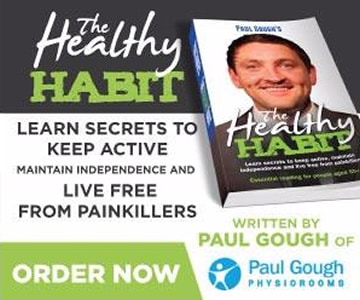
With England playing in the Euro 2016 next week, and as a former professional football physio, I know the importance of a cool down and how it stops you feeling stiff in the morning.
However even for people who don’t do sports, feeling stiff in the mornings can be a problem. A client last week asked:
Paul, do you have any advice for someone like me who is just incredibly stiff every day and suffering in a way that means I can’t do things as easily as I would like?
Paula, 53, Hart
A lot of the problems with stiffness is that people tend to think that if you’re stiff you should just rest until it goes.
Wrong.
Ultimately the action that keeps you from being stiff is moving. I’m not talking about going on a hike daily to ease your stiffness, more along the lines of gentle exercise.
One of the best ways to ease stiffness is to go for a swim.
Ideally, going for a swim each day would be great but if that seems a little difficult, try to go at least twice a week.
Swimming offers a very simple and safe way of keeping the joints moving.
If you have arthritis also, then swimming will help ease the pain of that too. The pain with arthritis can be multiplied if you stop or slow down. However if you think of swimming in general, even if you didn’t swim but tread water for a few minutes, you would still be moving your body. And as a result would still get the benefits of swimming.
You might be surprised at how much Stretching can help. Just think, stretching involves giving oxygen to your muscles, so that you are able to move more easily and can even increase your flexibility.
My advice would be to stretch for 7 minutes in the morning and 7 minutes before bed. This will help with any pains or signs of stiffness in the morning, as well as helping you get a good night’s rest.
Although swimming is a good form of gentle exercise, so is walking. By walking I don’t mean a hike or until you’re out of breath! I’m thinking more on the lines of adding walking into your everyday routine. You might only walk an extra 20 minutes a day, but at least you will be walking more than usual.
A useful way of adding walking into your lifestyle could be by looking over what you would normally do. I mean, if the phone rings would you normally sit down and talk?
Take advantage of your cordless phone and walk around.
Or even better, if you know you have to make a long phone call, why not do it on your mobile and go for a walk? Remember every step counts to a less stiffer you!
This kind of goes hand in hand with what I have just mentioned, but try and avoid sitting for a long period of time. If you must sit down though, then stretch full out on the couch. It’s much better for you than sitting on a chair for a long time (that’s what I tell my family!).
We’re NOT designed to sit and if you have spent a long period of time sat in a chair, then stretching out can be a nice relief for your muscles and joints.
So my advice to Paula and to anyone else who is suffering like Paula with everyday stiffness is to keep moving! It’s very easy to accept that everyday stiffness is something that just happens and nothing can be done about.
But a good way to think of it is this, your everyday stiffness that gives you neck, shoulder and back pain, means that something needs to be done by you. The day you accept your stiffness and don’t attempt to change it, the worse it will get.
For more tips on how to keep active, mobile and healthy, visit here to grab a copy of Paul’s best selling book The Healthy Habit. http://www.thehealthyhabitbook.com


